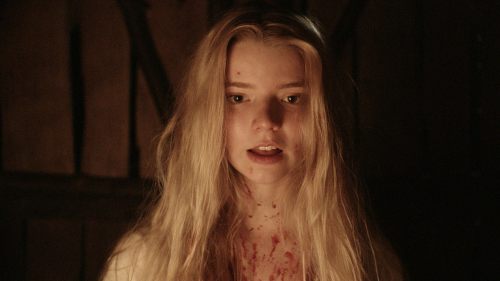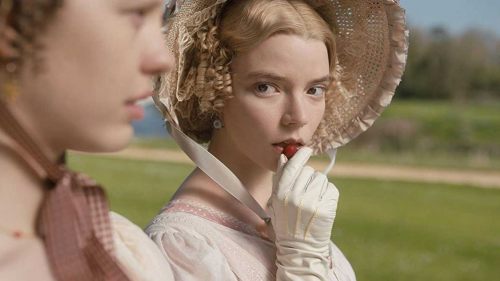Celebrating Jane Austen: CLUELESS, The Modern EMMA
Nowadays, I’ve noticed Tumblr reblogging gifs of a particular scene in Clueless in which a teacher summons Alicia Silverstone’s Cher to the front of her debate class to respond to the question “Should all oppressed people be allowed refuge in America?”
She replies, “So, OK, like right now, for example, the Haitians need to come to America. But some people are all ‘What about the strain on our resources?’ But it's like, when I had this garden party for my father's birthday right? But people came that like, did not R.S.V.P. I had to haul ass to the kitchen, redistribute the food, squish in extra place settings, but by the end of the day it was like, the more the merrier! And so, if the government could just get to the kitchen, rearrange some things, we could certainly party with the Haitians.”
The informality of the argument showcases Cher’s worse and best attributes. She delivers her ideas through the lens of a partying ditz, but there’s a good-naturedness within her rich girl tendencies. The monologue reveals her flexibility of character and her ability to amend her actions, which makes her later evolution more organic. In her hypothetical scenario, she admits outright to being stressed at the idea of more party guests, but instead of dismissing them for her own comfort, she wants to work with their presence.
Even if it’s proof she passed the Decent Human Being Test, this ditzy delivery earns her a C from a strict teacher. So Cher sets out to reverse her GPA through a scheme: hook up her rigid teacher with another teacher. The motive is clear-cut. If her teachers find romance and lax-up on their grading strictness, she gets what she wants and escapes academic consequences.
Her plan goes well. But watching her teachers flirt from afar, she doesn’t just celebrate the prospect of a good grade and more easy-going teachers, she lights up when she sees their bliss. Turns out, Cher’s teachers genuinely like each other to the point of eventual matrimony, though the convenient outcome does have the side-effect of gratifying Cher’s ego, causing her to extend her matchmaking services and overestimate her perceptive abilities in her quest to do good deeds.
She’s no different than her Regency counterpart in the movie’s source material, Jane Austen’s Emma. Cher and Emma both possess a rather intrusive preoccupation over the perceived flaws of other people. Enter Harriet and her modern counterpart Tai, who becomes Cher’s “Barbie doll,” a project.
This passage in Emma does not introduce Harriet as much as it establishes Emma’s condescending altruism: “[Emma] would improve her [Harriet]… she would form her opinions and her manners. It would be an interesting, and certainly a very kind undertaking.” Nice the girl is in her thoughts, but Emma, don’t you think you’re projecting your own ideals?
In Amy Heckerling’s script, the modern translation is Cher’s rebuke to her friend when she dismisses the frumpy Tai as a lost effort and liability to their popularity: “Don’t you want to use your popularity for a good cause?”
Like Harriet, the impressionable Tai gets swept up in Cher’s makeover for the majority of the film. Heckerling provides a necessary update and grants Tai a verbal agency Harriet didn’t have: Cher and Tai have a dramatic confrontation and come to terms with their differences and mismatched characteristics. Cher’s so busy molding Tai into a mirror of herself that she neglects to let Tai be her own person.
Even when their initial motives are selfish, Emma and Cher display a genuine investment in people’s welfare whether or not their goals succeed. Though each failure takes their ego down a peg. Cher frets for Tai’s emotional welfare. Emma owes up and apologizes to Harriet for leading her on to Elton’s assumed affection. As a result, Emma and Cher’s own dolls, their projects, emerge as fully-fleshed humans and compatriots.
As per coming-of-age rituals (or bildungsroman, if you want to apply academic terms), this renders Emma and Cher’s fiascos necessary for priceless epiphany: OMG, so that’s how I feel about this guy I’ve been bickering yet spending my spare time with. OMG, why am I playing with my friend’s feelings?
In the tradition of comedy, Emma ends on the optimistic outcome of a wedding—not for Cher and Josh, since they’re not of legal age (as if!). In Clueless, Cher kisses her true love and catches a bouquet at her teacher’s wedding. Emma and her Mr. Kingsley join hands in matrimony. All is well, though it required zany shenanigans and debunked presumptions to get there.
Both Cher and Emma get a makeover for their soul, their maturity. Austen’s book and its modern adaptation share a sunny optimism that’s almost escapist, but with reason: Cher and Emma mirror these edges of humanity we see within ourselves—the egoism co-existing with a potential to get better.
Happy birthday, Emma. And a happy belated birthday to Jane Austen. Even after two centuries, the merriment of your happy endings hasn’t expired. We still need those happy endings today.



